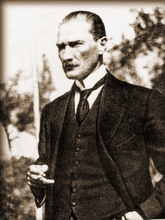Rosetta Stone continues to drill me on time. As a part of reinforcing that, I decided to see how many hits I'd get by punching "saat iki" (2 o'clock) into a Google search. Among the 1.2 million hits (!!), I found this—http://www.hikayeler.net/yazilar/saat-iki/.
Among other things, this site includes a poem called, yep, Saat İki. Seeing it gave me the thought of trying to parse through it as opposed to parsing through a Turkish news article. Would it be easier or harder? I don't know. I do know, however, that it's less important what I try to parse than the parsing effort itself, within reason.
The poem's a bit long so I don't know if I can parse it all in one sitting (i.e., post). But here goes.
"Takvimlere yine yenik düştü günler"
Takvim means calendar. -lere? I don't recognize the suffix. The closest thing to it I recall is -leri and -ları, which means their. "Their calendar" then? Maybe. Maybe not. Moving on for now. Let's see if the context answers the question.
Yine means "1. again, once again, once more. 2. still, nevertheless, even so".
Yenik means partially eaten, eroded, defeated. Hm, doesn't look like this will be a perky poem.
Düştü has me stumped. It's not listed in the online dictionary. Düş means dream but that doesn't seem to fit here. As I browsed the dictionary, I noticed that words starting with düş seem related to falling (düşmek).
Günler means days. No mystery there!
So, that first line seems to say something like "It's that time of year again, eroding, fallen days..." Autumn?
We'll see. I've got to sign off for now.
Subscribe to:
Post Comments (Atom)


1 comment:
"Takvimler" does indeed mean "calendars," at least literally. The "e" on the end is the dative case (see my comment on your previous post). You also got "düştü" right: it means "fell, has fallen." So this line is something like "Worn-out days have fallen onto the calendar again." (It should be "yenik günler," but poetic license lets him split the adjective-noun pair.)
And if you want perky, look to another poetic tradition. Turkish literature is overwhelmingly melancholy, something it has in common with Persian literature, from which it drew a lot of influence.
Post a Comment